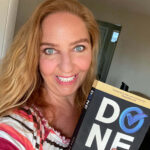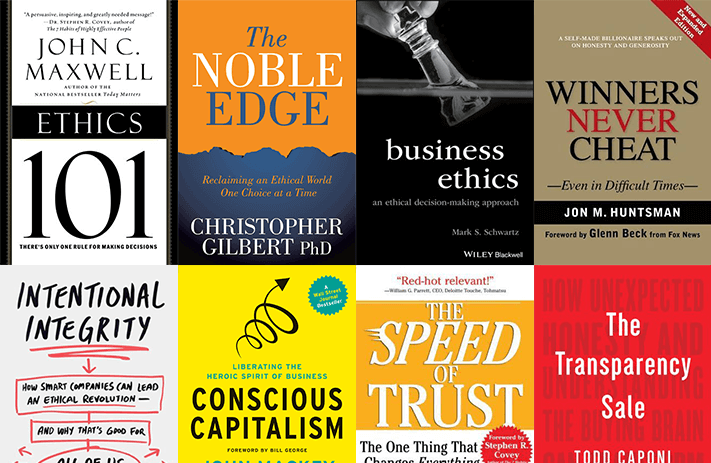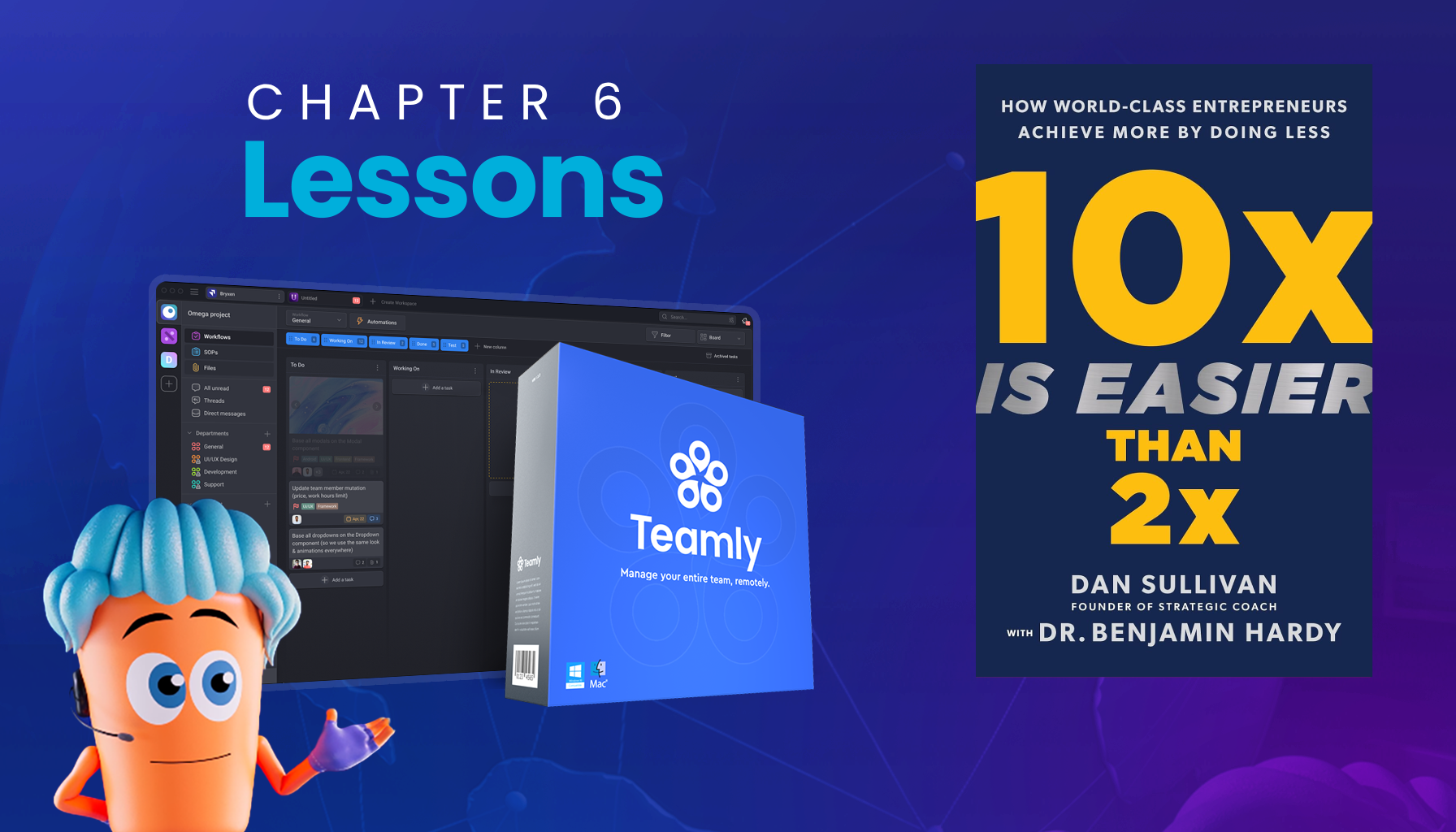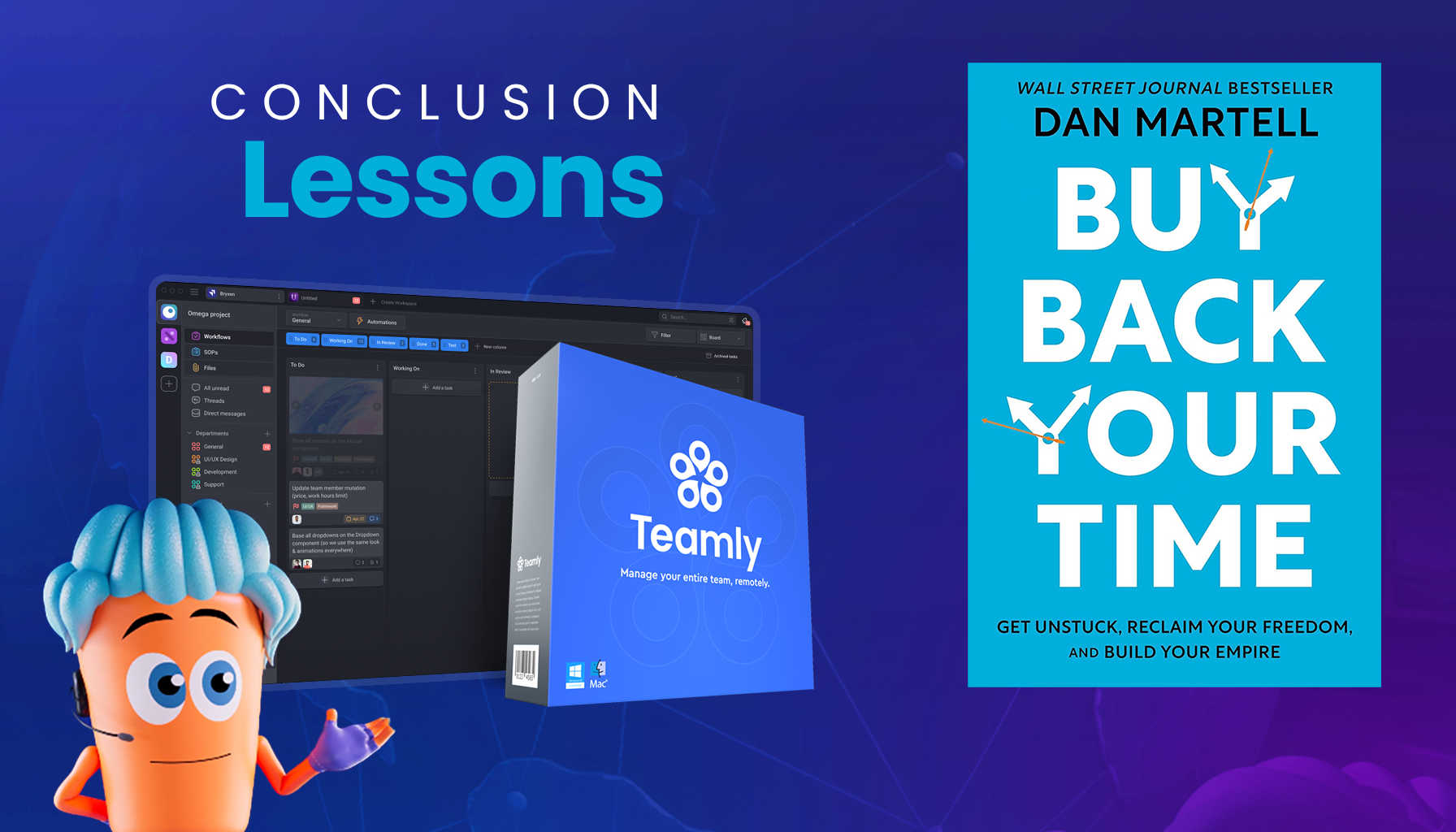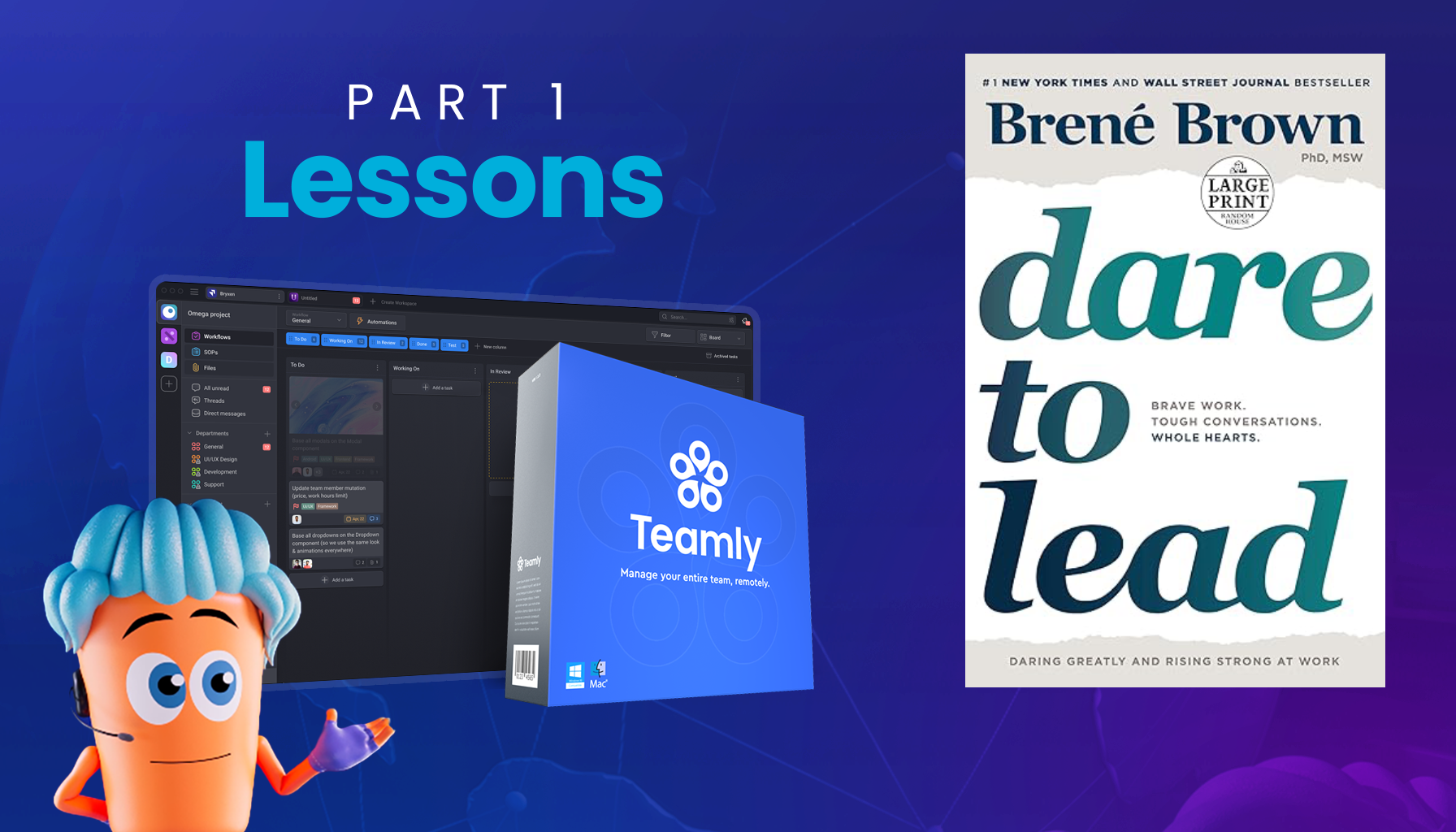
Click the button to start reading
The 15 Best Business Ethics Books
There’s a famous Warren Buffet quote, “It takes 20 years to build a reputation and five minutes to ruin it.” In a nutshell, Buffet perfectly illustrates why business ethics are such a pressing concern in this day and age.
Yet, as important as they are, businesses are still prone to making unethical decisions due to fear, greed, and failure to consider the consequences. If you find that concerning, you’ll love the business ethics books on this list because they contain something for everyone.
So, keep reading to discover the best books about business ethics. Among them, you’ll find books that guide you on how to foster integrity in the workplace, use a framework for making ethical decisions, and of course, books that’ll inspire you to be your best self.
1. Ethics 101 by John C. Maxwell
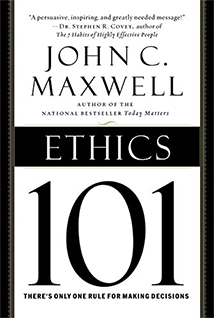
Clocking in at just 81 pages, Ethics 101: What Every Leader Needs to Know is a short but powerful ethics primer written by leadership expert, John C. Maxwell. In Ethics 101, Maxwell argues that although virtually everyone claims they want businesses to behave more ethically, most of us take ethical shortcuts in our own lives, failing to display the same integrity we request from others.
Fortunately, Maxwell suggests that ethics don’t need to be complicated. Instead, he encourages executives to follow the Golden Rule, meaning you should treat others in business the way you want them to treat you. Although the tenet is a simple one, Maxwell argues that it acts as a compass for any type of business.
Notable Quotes
- “There’s no such thing as business ethics–there’s only ethics. People try to use one set of ethics for their professional life, another for their spiritual life, and still another at home with their family. That gets them into trouble. Ethics is ethics. If you desire to be ethical, you live it by one standard across the board.”
- “If the environment–the systems and goals–of an organization encourage and reward unethical behavior, then merely addressing individual employee’s actions will not improve the situation.”
- “In the short term, behaving ethically may look like a loss (just as one can temporarily appear to win by being unethical). However, in the long term, people always lose when they live without ethics.”
2. The Speed of Trust by Stephen M.R. Covey
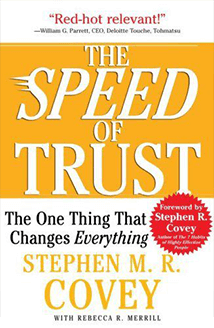
Although The Speed of Trust: The One Thing That Changes Everything was first published in 2006, it remains on Amazon’s bestseller list even to this day. People are clearly taken with its premise that trust–and how quickly you establish it–is the single most critical component of successful leadership.
Perhaps more importantly, Covey maintains that trust yields better business results, and he offers plenty of relevant examples to make his case. In the book, he also identifies 13 behaviors of high-trust leaders, while explaining how the concept of trust relates to a variety of different scenarios.
With over 2,000 5-star reviews, The Speed of Trust is a must-read if you want to learn how you can promote greater trust in your personal and professional relationships.
Notable Quotes
- “Trust always affects two outcomes–speed and cost. When trust goes down, speed will also go down and cost will go up.”
- “The traditional business formula says that strategy times execution equals results: But there is a hidden variable to this formula. Trust–either the low-trust tax, which discounts the output, or the high-trust dividend which multiplies it.”
- “Contrary to what most people believe, trust is not some soft, illusive quality that you either have or you don’t; rather, trust is a pragmatic, tangible, actionable asset that you can create–much faster than you probably think possible.”
3. The Transparency Sale by Todd Caponi
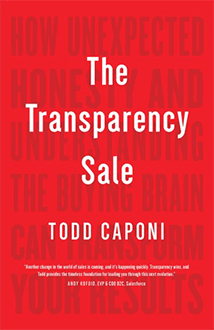
Although The Transparency Sale: How Unexpected Honesty and Understanding the Buying Brain Can Transform Your Results only focuses on the selling aspect of business ethics, it has a powerful (albeit counterintuitive) message: by being upfront about your product’s flaws, you can close bigger and better deals faster.
As Caponi points out, customers are naturally skeptical of 5-star reviews and the notion of product perfection … plus, with the advent of the Internet, they have tons of information at their disposal and can easily find out your product’s shortcomings anyways.
That’s why “unexpected honesty” is such a successful sales strategy for those in sales and marketing. In the book, Caponi explains how to use a transparent approach throughout the entire buying lifecycle, illustrating his points with several real-life examples.
Notable Quotes
- “We have been taught to sell perfection, but perfection does not sell. To win in this digital area, where feedback is all around us and easy to come by, we need to adjust how we sell to optimize for the way buyers buy.”
- “Transparency wins, and now there is science to back it up … science, which can be applied to every element of your sales arsenal.”
- “Don’t be afraid of the flaws in your offerings, as exposing those flaws may be the very reasons your customers engage with you, buy from you, and keep buying from you. “
4. Conscious Capitalism by John Mackey and Raj Sisodia
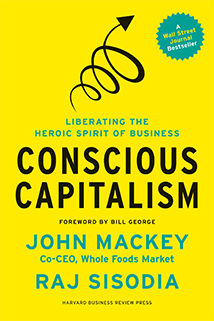
Nice guys don’t always finish last–at least, not according to John Mackey. In his book, Conscious Capitalism: Liberating the Heroic Spirit of Business, the Whole Foods co-founder suggests that businesses don’t solely prioritize profitability but instead, follow a conscious capitalism paradigm in which the focus is on creating value for all stakeholders, such as customers, employees, shareholders, vendors, society, and the environment.
In Conscious Capitalism, you’ll learn practical advice for operating more ethically, following the four principles of Conscious Capitalism, a visionary philosophy that’s already practiced by a number of highly successful companies, including Trader Joe’s, Harley-Davidson, Google, Panera Bread, Starbucks, Costco, and Southwest Airlines.
Notable Quotes
- “Just as happiness is best experienced by not aiming for it directly, profits are best achieved by not making them the primary goal of the business.”
- “Conscious businesses believe that creating value for all their stakeholders is intrinsic to the success of their business, and they consider both communities and the environment to be important stakeholders.”
- “One day, virtually every business will operate with a sense of higher purpose, integrate the interests of all stakeholders, develop and elevate conscious leaders, and build a culture of trust, accountability, and caring.”
5. Intentional Integrity by Robert Chesnut
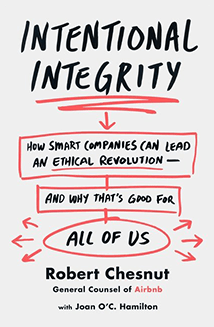
In Intentional Integrity: How Smart Companies Can Lead an Ethical Revolution, former Airbnb Chief Ethics Officer Robert Chesnut argues that although we’re all capable of dishonesty, most companies spend little time talking about it–which is a problem because companies that don’t take integrity seriously are doomed to fail.
Chesnut then provides a 6-step process for leaders, so they can foster a culture of integrity in the workplace, before identifying the 10 most common integrity issues. With lots of real-world examples, Intentional Integrity–which made Inc. Magazine’s “Top 10 Business Books of 2020” list— is a compelling read for anyone interested in business ethics.
Notable Quotes
- “Intentional integrity is not just a vow to be virtuous. It means making a serious and thorough effort to, first, identify an organization’s purpose and the values it stands for; then develop specific rules that reflect those values; and finally, drive the importance of following the rules into every corner–and level–of a company. ”
- “Ambiguity is the enemy of integrity.”
- “The trouble is, most companies don’t talk much about integrity. Many seem to fear that it might attract unwanted attention, scrutiny, or accusations of hypocrisy.”
6. Winners Never Cheat by Jon M. Huntsman, Sr.
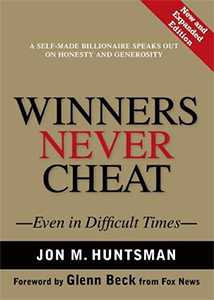
There’s a common belief in business that to succeed, you have to cut corners. After all, everybody’s doing it–right? Although Huntsman maintains that “ethical corner-cutting has risen faster than the price of a gallon of gas,” he makes a strong case against the practice in Winners Never Cheat: Even in Difficult Times.
Huntsman should know. He built a $12 billion-dollar company from scratch, and along the way, he faced many difficult decisions, unforeseen obstacles, and tough times–yet he still managed to succeed without compromising his values. In this inspiring book, he provides real-world examples that illustrate how he did it, and more importantly, he offers practical advice on how you can too.
Notable Quotes
- “The rationale that you have to cheat to stay competitive is a powerful lure. Moral bankruptcy is the inevitable conclusion.”
- “When expediency trumps propriety, it results in an escalating toboggan ride down a mountainside, a descent impossible to stop until the sled crashes from excessive speed and lack of direction.”
- “Take your values to work. Don’t disconnect them when you sit down at your desk. There should not be a conflict between making a profit and adhering to traditional principles of decency and fairness.”
7. Business Ethics by Mark S. Schwartz
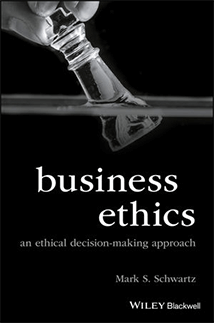
In Business Ethics: An Ethical Decision-Making Approach, business ethics professor Mark S. Schwartz takes an in-depth look at the elements that determine someone’s moral character. Along the way, he keeps things entertaining by offering relevant, real-world examples to illustrate various concepts.
Schwartz also examines what prevents ethical behavior, before providing a “3P” framework for making ethical decisions: the public test (would you want your decision to be made public?), the parent test (what would you tell your child to do?), and the pillow test (can you sleep peacefully at night having made your decision?).
Notable Quotes
- “When our moral character is weak or has been placed under too much stress, we can more easily reach an ethical tipping point or personal ethical threshold and morally compromise our moral value system leading to unethical behavior.”
- “In a business organizational context, the strength of our moral character often dictates the extent to which we are prepared to challenge decision making by raising ethical concerns, report ethical misconduct, or report bad news or mistakes to our managers.”
- “Those who possess strong levels of moral competence tend to be able to judge situations as right or wrong rather than remaining unclear or undecided over what the right action consists of.”
8. The Noble Edge by Christopher Gilbert
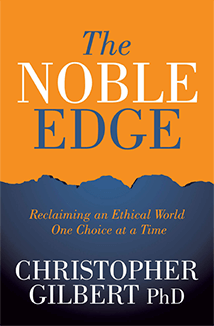
Gilbert kicks off The Noble Edge: Reclaiming an Ethical World One Choice at a Time in a compelling way, as he recounts how his hot meal delivery company was destroyed by an unethical competitor. Fortunately for his readers, that experience prompted Gilbert to earn a Ph.D. specializing in leadership ethics before becoming an author and international ethics consultant.
In this award-winning book, Gilbert uses humorous anecdotes, personal stories, and real-world examples to illustrate how you can bring ethics into your home, boardroom, community, and beyond. The book covers a lot of ground, providing three research-proven steps and nine principles for leading an ethically-driven life.
Although The Noble Edge’s focus isn’t solely on business ethics, it’s still an inspirational book that’s well worth a read. Business executives, in particular, will appreciate the chapter covering Enron and corporate ethics.
Notable Quotes
- “There is no right way to do the wrong thing.”
- “In the broadest context, an ethical choice is any decision or action that has an impact on others now, or in the future.”
- “Here’s the surprise about invoking the legal or illegal question to judge ethical behavior (which is common practice in business): legality is the low bar where moral conversations start and ethical actions begin. ‘Legal’ or ‘illegal’ is the beginning of the discussion about ethics, not the end.”
9. Net Positive by Paul Polman and Andrew Winston
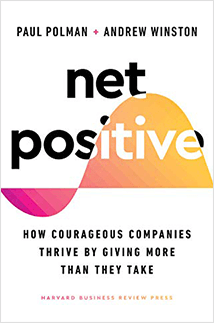
Named one of the Best Books of the Year by Bloomberg, Net Positive: How Courageous Companies Thrive by Giving More Than They Take asserts that to thrive today and tomorrow, companies must become net positive–in other words, they must give more than they take.
Written by former Unilever CEO Paul Polman and corporate sustainability expert Andrew Winston, Net Positive argues that government can’t tackle the world’s most urgent problems alone. Subsequently, businesses must step up. Fortunately, the book offers plenty of tangible advice on how to do that–while still meeting shareholders’ demands.
Notable Quotes
- “… our vision of net positive is a business that improves well-being for everyone it impacts and at all scales–every product, every operation, every region and country, and for every stakeholder, including employees, suppliers, communities, customers, and even future generations and the planet itself.”
- “The ultimate question is this: Is the world better off because your business is in it?”
- “… given the scale and urgency of climate change, the moral imperative of tackling inequality, and the changing nature of financial markets, the quarterly-focused, shareholder-first mantra is wildly unfit for today’s world and is ultimately self-defeating.”
10. The Hard Sell by Evan Hughes
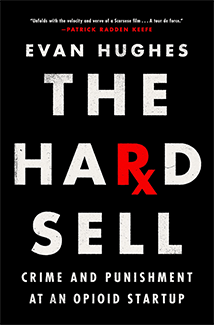
Unlike the other books on this list, The Hard Sell: Crime and Punishment at an Opioid Startup doesn’t teach leaders how they can behave more ethically. What it does instead is examine the consequences of behaving unethically, by taking an in-depth look at the Insys corporation’s sales tactics.
For those unfamiliar with the Insys saga, the pharmaceutical company developed Subsys, an oral fentanyl spray so powerful that it was only approved by the FDA for breakthrough pain in cancer patients. Despite that, Insys founder John Kapoor aggressively drove sales representatives to do whatever it took to make a sale–even if it meant bribing unscrupulous doctors to prescribe Subsys to patients who were cancer-free.
A powerful morality tale and riveting read, The Hard Sell takes an in-depth look at what businesses are capable of when ethics go out the window.
Notable Quotes
- “What separates the opioid crisis from all previous drug epidemics is that it has its roots in drugs that are perfectly legal to use–FDA-approved and highly regulated painkillers much like Subsys.”
- “An analysis of data from 2014 and 2015, in the thick of the epidemic, showed that the more opioid prescriptions a doctor writes, the more likely it is that drug companies are paying him.”
- “Some reps came to believe that just by doing their jobs at Insys, they were becoming complicit in something troubling.”
11. From Values to Action by Harry M. Kraemer Jr.
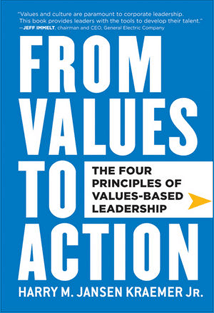
Former Baxter International CEO Harry M. Kraemer asserts in From Values to Action: The Four Principles of Values-Based Leadership that value-driven leadership is characterized by self-reflection; balance and perspective; true self-confidence, and genuine humility. Furthermore, Kraemer argues that by doing the right thing, value-driven leaders can achieve exceptional results.
Broken into three parts, From Values to Action identifies the four principles of value-based leadership, before explaining the characteristics of value-based organizations. Finally, the book closes with advice on how companies can deal with the 3 C’s: change, controversy, and crisis. Straightforward and insightful, From Values to Action provides immediately applicable lessons and real-world examples from Kraemer’s own career.
Notable Quotes
- “Learning how to take the time to step back and reflect is absolutely essential to your becoming a values-based leader.”
- “Self-reflection is the key to identifying what you stand for, what your values are, and what matters most.”
- “Values-based leadership requires lifelong learning and a continuous process of self-reflection to discover those areas in which we need to grow and develop. We are always traveling toward a forward-moving goal; we never arrive.”
12. Grow the Pie by Alex Edmans
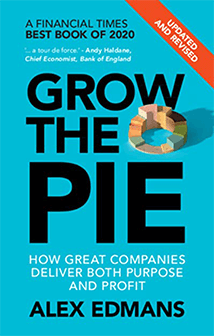
Although this tome weighs in at 540 pages, Grow the Pie: How Great Companies Deliver Both Purpose and Profit is well worth the time spent reading. In Grow the Pie, finance professor Alex Edmans explains the principles of what he calls pieconomics, an approach to business that seeks to create profits only through creating value for society.
Edmans argues that typically, companies have had a pie-splitting mentality–if I give you a piece of pie, there’s less for me. However, with a pie-growing mindset, businesses can remain true to their purpose, benefit society, and generate healthy, sustainable profits. Edmans uses an evidence-based approach to back up this assertion before explaining what companies can do to grow the pie.
Updated and expanded since the pandemic, Grow the Pie successfully counters the notion that companies need to choose between purpose and profit. Instead, businesses can be a force for good by growing the pie for all stakeholders.
Notable Quotes
- “By applying a radically different approach to business, enterprises can create both profit for investors and value for society.”
- “A pie-growing company’s primary objective is social value, and it views profits as a by-product.”
- “Pieconomics is urgent given the scale of social problems and the power of business to alleviate or exacerbate them. Innovation and excellence to solve these problems often involves an attitudinal shift rather than a major financial outlay, and can be practiced by all firms–even small enterprises or those who are financially constrained.”
13. Conscious Business by Fred Kofman
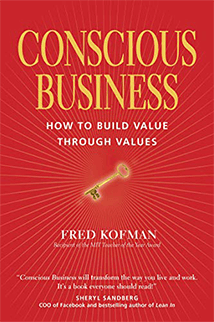
In Conscious Business: How to Build Value Through Values, executive coach Fred Kofman maintains that consciousness is the source of organizational greatness. According to Kofman, a conscious business aims to make all stakeholders happy, while aligning work with core values.
While this is an ongoing process that demands constant attention and commitment, Kofman believes it’s a necessity … that businesses must become conscious if they want to survive.
Fortunately, Conscious Business provides simple tools you can use to develop greater consciousness. The book offers valuable insights on qualities like unconditional responsibility, unflinching integrity, and authentic communication to provide readers with a “consciousness roadmap.”
Notable Quotes
- “In order to do business consciously, we need to ponder the most fundamental questions pertaining to reality and human existence and let these insights guide our business choices.”
- “Conscious employees are an organization’s most important asset; unconscious employees are its most dangerous liability.”
- “A great manager leads through unconditional responsibility, essential integrity, ontological humility, authentic communication, constructive negotiation, impeccable coordination, and emotional mastery.”
14. Delivering Happiness by Tony Hsieh
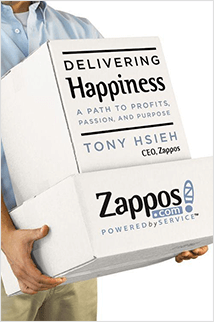
One thing the books on this list have in common is their emphasis on the notion that companies can turn a healthy profit–while still remaining ethical. Former Zappos CEO Tony Hsieh is no different, and in his book, Delivering Happiness: A Path to Profits, Passion, and Purpose, he explains Zappos’ phenomenal growth, even as the company adhered to its ethics and core values.
Divided into three sections, Delivering Happiness begins by detailing Hsieh’s background, including how he made his way to Zappos. From there, the book covers the important philosophies Zappos follows, before outlining Zappos’ vision for taking things to the next level.
An inspirational read, Delivering Happiness maintains that corporate culture should be a company’s #1 priority … and by creating a unique corporate culture, businesses don’t have to sacrifice profits for purpose. Instead, they can deliver happiness to all their diverse stakeholders, while still remaining true to their core values.
Notable Quotes
- “Your personal core values define who you are, and a company’s core values ultimately define the company’s character and brand. For individuals, character is destiny. For organizations, culture is destiny.”
- “We must never lose our sense of urgency in making improvements. We must never settle for ‘good enough,’ because good is the enemy of great.”
- “When you focus on increasing the happiness of your employees, colleagues, vendors, and customers, you not only increase your own happiness but your chances for success.”
15. The Business Ethics Field Guide by Bill O’Rourke, Brad Agle, and Aaron Miller
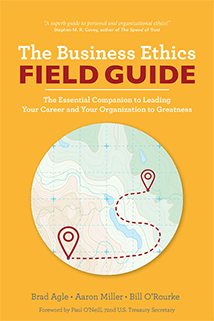
While there are hundreds of books explaining how leaders can manage better and communicate more effectively, few of them tackle the thorny topic of business ethics. In The Business Ethics Field Guide: The Essential Companion to Leading Your Career and Your Company to Greatness, the authors suggest that clarifying values–and finding a way forward when those values conflict–is an essential, yet oft-neglected third skill.
Fortunately, The Business Ethics Field Guide provides the answer to that conundrum by offering 13 types of ethical dilemmas, as well as guidance on how to handle them. The book also explains the various factors that make it difficult for us to do the right thing. All in all, The Business Ethics Field Guide is a must-read if you want to develop the ability to proceed ethically when faced with challenging business dilemmas.
Notable Quotes
- “… when people can trust each other, doing business becomes much less expensive for everyone, because the costs of self-preservation go down. The fruits of cooperation, fundamental to any economic activity, grow more readily.”
- “Ethical decision-making skills are every bit as critical to organizations as strong management and leadership skills.”
- “In an interconnected world, it is nearly impossible not to be involved in at least a tangential way with products or activities that conflict with your values.”
